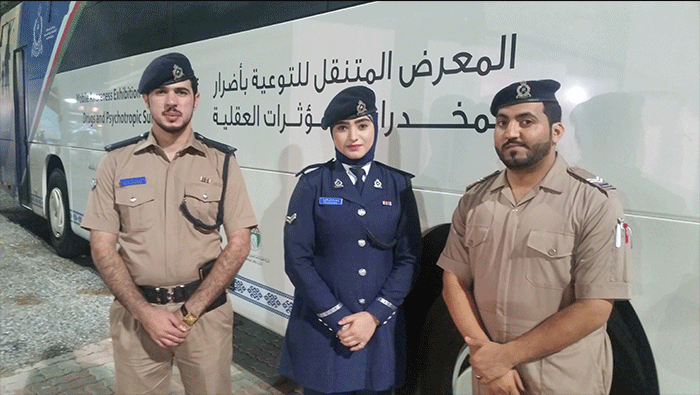
Muscat: More than 300 people a day are visiting the Royal Oman Police’s drug awareness centre at the Muscat Festival as they seek to educate themselves about the dangers of narcotics and substance abuse.
First set up in 2013, the ROP’s bus and tent that have been setup at Naseem Garden contain samples of the various illegal substances that are currently circulate the market, which may range from plant-based narcotics such as marijuana and hashish, to much harsher drugs which include cocaine and heroin.
A section of police officers are available at all times to instruct and advice those who seek to become more aware of the dangers of drugs.
“The role of the awareness team at the festival is to present advice, information and answers to all the questions the audience may have,” said Raya Ali Al Qanubi, of the ROP’s office of the Directorate General for Combating Drugs and Psychotropic Substances. “It is important to monitor their children inside and outside the house, as well as allow them productive and educational hobbies and activities during their free time.
“The Narcotics Committee has put together many awareness campaigns and images to help guide children and their parents,” she added. “The festival has different stalls focusing on different aspects such as narcotics and smuggling methods.
“The area opposite the ROP stall has the mobile awareness bus along with pictures of victims and printed flyers on the effects of drugs, as well as the diseases caused by drug use.”
Although they may seem a little graphic, the images that take up a major portion of the bus and the tent are not meant to scare, but to educate.
“We are trying to educate people from all ages, and from all walks of life,” said Al Qanubi. “This is not just meant for a particular section of society, but for everyone. All age categories can learn and be educated, and every category has its own personalized programme, should they seek help from us.
“Due to the Sultanate’s strategic position in the Middle East, the most common drug smuggling routes are through the sea,” she added.
Al Qanubi also urged parents to ensure their children were being brought up the right way.
“We always try to advice parents to monitor their children’s activities and lives,” she said. “Children have to have hobbies and activities to do in their free time. If parents notice any behavioral problems or any suspicious changes in their children, they are welcome to call the free 24-hour number 1444 for answers to any questions.”
“We had a big turn out and great response from the crowd,” she added. “This is a good indicator and reflects the desire of the community to learn about drugs and its negative effects.”
According to the Omani Drugs Combat Law, which was issued under Royal Decree No. 17/99, those who export, import, or manufacture drugs are to be given the death penalty and fined OMR 25,000.
In addition, a temporary imprisonment for no less than 10 years and a fine of between OMR 3000 and OMR 15000 shall be imposed on those who buys or receives drugs, while those who commit this crime inside educational and cultural facilities such as mosques will receive a life imprisonment sentence.
The law also allows for those who have taken drugs to enter rehabilitation centres that have been set up for this purpose, and their names and identities are to be guarded with the strictest of confidentiality.